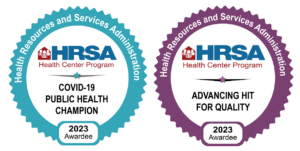
Every year, we see a spike in the number of flu cases around the U.S. after the holidays and peaking around February. Experts haven’t quite nailed down why we see such an increase in flu cases during winter. Though they have noticed the pattern and a few contributing factors. Cold weather brings drier air, kids are back in school spreading germs…
If you might have the flu or need a flu shot, make an appointment ASAP!
There’s no denying that we can expect more sicknesses during the colder months, but we can prevent one of the most common viruses that leads to an average of 20,000 deaths in the U.S. each year.
Good news! “Compared to last year, the flu strain causing the most illness is a somewhat milder virus.” Last year witnessed cases of the flu leading to more hospitalizations and deaths than normal.
So what should we look for and what can we do to keep away that nasty flu virus?
5 Ways to Prevent Getting and Spreading the Flu
- Wash your hands often. And well. None of this “running your fingers under water for a few seconds.”
- Avoid eating or drinking after others.
- Get plenty of rest! Less sleep = lower immune system.
- Keep sick kids at home. Don’t go out in public sick, if you can help it.
- Get your flu vaccine!
Period of Contagiousness
You may be able to spread flu to someone else before you know you are sick, as well as while you are sick.
- People with flu are most contagious in the first 3-4 days after their illness begins.
- Some otherwise healthy adults may be able to infect others beginning 1 day before symptoms develop and up to 5 to 7 days after becoming sick.
- Some people, especially young children and people with weakened immune systems, might be able to infect others for an even longer time.
How to Tell You Have the Flu
Common Symptoms
- Abrupt onset of symptoms
- Fever
- Aches
- Chills
- Fatigue or weakness
- Chest discomfort
- Cough
Occasional Symptoms
- Sneezing
- Stuffy nose
- Sore throat
- Vomiting
Quick Tips About the Flu Vaccine
- The flu vaccine CANNOT give you the flu.
- It can take about two weeks for the flu vaccine to take effect.
- You should get vaccinated every year.
- The flu vaccine can reduce the risk of flu-related hospitalization.
- The flu vaccine can minimize the severity of symptoms for people who get the vaccine but still get sick.
- Getting vaccinated can help protect other high-risk people around you.
Who is Considered High Risk for the Flu?
Pregnant women, older adults above the age of 65, pregnant women, and young children are more likely to suffer complications from a flu virus. Their immune systems are often weaker and can’t fight off the virus as well as typical healthy adults.
The flu can also worsen chronic health problems like asthma, lung disease, heart disease.
What to Do if You Think You Have the Flu
If you find yourself very sick or are considered high risk for serious complications from the flu and are displaying flu-like symptoms, make an appointment with your healthcare provider ASAP! If it’s outside normal office hours and you’re concerned about waiting, visit the closest emergency room.
Don’t worry about being overly cautious!
Even if you’re not considered to be at high risk for the flu, a doctor’s visit and proper care could prevent you from spreading the flu to someone who is considered high risk.



